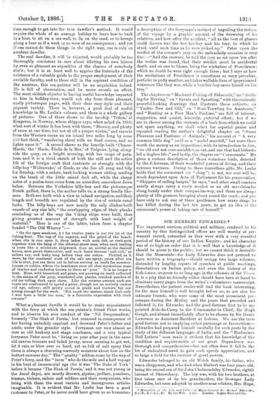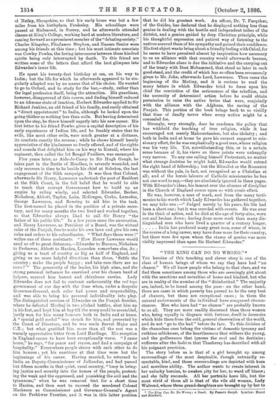SIR HERBERT EDWARDES. 0 Tux important services, political and military, rendered
to his country by this distinguished officer are well worthy of per- manent record, connected as they were with a very eventful period of the history of our Indian Empire ; and his character was of so high an order that it is well that a knowledge of it should be given to the public ; but we cannot think it desirable that the Memorials—for Lady Edwardes does not pretend to have written a biography—should occupy two large volumes, distended by lengthy reports of speeches at public meetings, dissertations on Indian policy, and even the history of the Koh-i-noor, as given to us long ago in the columns of the Times. It is a pity that no friendly editor should have been at hand to eliminate many pages from the writer's voluminous manuscript. Nevertheless, the patient reader will find the book interesting, for the man himself is well brought before us, as are also his intimate friends, who were some of the most prominent per- sonages during the Mutiny and the years that preceded and followed it, for Edwardes had the good-fortune first to be ap- pointed Aide-de-Camp to the Commander-in Chief, Sir Hugh Gough, and almost immediately after to be chosen by Sir Henry Lawrence as Assistant-Resident at Lahore. We use the term good-fortune not as implying either patronage or favouritism- Edwardes had prepared himself carefully for such posts by the study of the different languages of India, and the " Brahminee Bull Letters" soon made it evident that his knowledge of the condition and requirements of our great Dependency was thorough and comprehensive—but not often does it fall to the lot of undoubted merit to gain such speedy appreciation, and so large a field for the exercise of great powers.
Edwardes belonged to an old Welsh fatally, his father, who was a clergyman, and who died when Herbert was four years old, being the second son of Sir John Cholmondeley Edwardes, eighth baronet of Shrewsbury. The boy was, with his two brothers, at first taken care of by his grandmother, the Dowager Lady Edwardes, but soon adopted by another near relative, Mrs. Hope,
• Memorial, of the Life and Letters of Major-General Sir Herbert- Edworder, K.C.B., K.C.S.I., &e. By his Wife. 2 vols. London: Kogan Paul and Co.
of Netley, Shropshire, so that his early home was but a few miles from his birthplace, Frodesley. His schooldays were passed at Richmond, in Surrey, and he afterwards attended classes at King's College, working hard at modern literature, and coming forward as apromiuent member of the "debating society." Charles Kingsley, FitzJames Stephen, and Nassau Senior were among his friends at this time ; but his most intimate associate was Cowley Powles, the loving intercourse between these kindred spirits being only interrupted by death. To this friend are written some of the letters that afford the best glimpses into Edwardes's inner life.
He spent his twenty-first birthday at sea, on his way to India ; but the life for which he afterwards appeared to be sin- gularly adapted was by no means that of his choice. He wanted to go to Oxford, and to study for the bar,—study, rather than the legal profession itself, being the attraction. His guardians, however, disapproved of this course, and finding himself reduced to an irksome state of inaction, Herbert Edwardes applied to Sir Richard Jenkins, an old friend of his family, and easily obtained a "direct appointment" to India, although he looked upon the going thither as nothing less than exile. But having determined upon the step, he threw himself eagerly into his new career. His first letter to his friend Powles gives a capital description of his early experiences of Indian life, and he frankly states that its evils, like most other evils, were much greater at a distance, its comforts exactly the reverse ; while he shows himself keenly appreciative of the kindnesses so freely offered, and of the sights and sounds that delighted him on his way to Kurnal, where his regiment, then called the 1st Bengal Fusiliers, was encamped.
Five years later, as Aide-de-Camp to Sir Hugh Gough, he takes part in the Battle of Moodkee, is severely wounded, and only recovers in time to be beside his chief at Sobriton, the last engagement of the Sikh campaign. It was then that Colonel, afterwards Sir Henry, Lawrence undertook the post of Resident at the Sikh Court, in the full belief that he would be able to teach that corrupt Government how to build np an empire by ruling wisely, and selected Edwardes, Becher, Nicholson, Abbott, Taylor, Lake, McGregor, Cocks, Lnmsden, George Lawrence, and Bowring to aid him in the task. The first-named he placed in the position of a private secre- tary, and for many months the two lived and worked together, so that Edwardes always liked to call Sir Henry " the father of his public life." In a few years came the annexation, and Henry Lawrence, as President of a Board, was the virtual ruler of the Punjab, free to make his own laws and give his own rules and orders to his subordinates. " What days those were !" writes one of these assistants. " How Henry Lawrence would send us off to great distances,—Edwardes to Bunnoo, Nicholson to Peshawur, Abbott to Hazitra, Lumsden somewhere else, &c. ; giving us a tract of country as big as half of England, and giving us no more helpful directions than these, Settle the country ; make the people happy ; and take care there are no rows r " The generosity of the leader, his high aims, and the strong personal influence he exercised over his chosen band of helpers, secured him honest and chivalrous service. Lady Edwardes does not fail to contrast unfavourably the red tape government of our day with the time when, under a despotic Governor-General, each ruler had power and responsibility, and was able to bring his personal individuality into play. The distinguished services of Edwardes on the Punjab frontier, where he defeated Moolraj in two pitched battles, shut him up in his fort, and kept him at bay till the army could be assembled, justly won for him many honours both in India and at home. A "special gold medal" was struck for him, and presented by the Court of Directors, and he was made Brevet Major and C.B. ; but what gratified him more than all the rest was a warmly appreciative letter from Lord Hardinge. His reception in England seems to have been exceptionally warm. " I came home," he says," for peace and repose, and find a campaign of hospitality." Everywhere people strove with each other to do him honour ; yet his exertions at that time were but the beginnings of his career. Having married, he returned to India as Deputy-Commissioner of Jullundur, and had passed but fifteen months in that quiet, rural country, " busy in bring- ing justice and security into the homes of the people, protect- ing the weak and the oppressed, and punishing the evil and the tyrannous," when he was removed first for a short time to Hazitra, and then sent to succeed the murdered Colonel Mackeson as Commissioner and Governor-General's Agent on the Peehamur Frontier, and it was in this latter position that he did his greatest work. An officer, Dr. T. Farquhar, of the Guides, has declared that he. displayed nothing less than genius in dealing with the hostile and independent tribes of the district, and a genius guided by deep Christian principle, while his thoughtful expression and patient way of listening to the natives assured them of his sympathy and gained their confidence. His first object was to bring about a friendly feeling with Cabal, for he seems to have perceived almost by inspiration how necessary to us an alliance with that country would afterwards become, and to Edwardes alone is due the initiative and the carrying out of the treaty with Dost Mohammed, that stood us later in such good stead, and the credit of which has so often been erroneously given to Mr. John, afterwards Lord, Lawrence. Then came the beginning of the Mutiny, and it is curious to read the many letters in which Edwardes tried to force upon his chief the conviction of the seriousness of the rebellion, and the necessity of determined action before he could obtain permission to raise the native levies that were, conjointly with the alliance with the Afghans, the saving of the Punjab. This portion of the book brings back to us vividly that time of deadly terror when every native might be a concealed foe.
Strongly, very strongly, does he condemn the policy that has withheld the teaching of true religion, while it has encouraged not merely Mahometanism, but also idolatry ; and both in India and at home he gave his earnest support to mis- sionary effort, for he was emphatically a good man, whose religion was his very life. Yet, notwithstanding this, or in a certain sense because of it, his views on those points were unhappily very narrow. To any one calling himself Protestant, no matter what strange doctrine he might hold, Edwardes would extend the right hand of fellowship ; bat the Ritualist or the Romanist was without the pale, in fact, not recognised as a Christian at all ; and of the heroic labours of Catholic missionaries he has not one word to say,—they are absolutely ignored in these pages. With Edwardes's ideas, his lament over the absence of discipline in the Church of England comes upon us with comic effect.
He was, however, a man of mark, and from the many testi- monies to his worth which Lady Edwardes has gathered together, we may take one :—" Judged merely by his years, his life had been a short one ; but it was crowded with events. He was ever in the thick of action, and he died at the age of forty-nine, worn out and broken down ; having done more work than many dis- tinguished men who have lived a quarter of a century longer.
India has produced many great men, some of whom, in the course of a long career, may have done more for their country, but there were few upon whom the stamp of genius was more visibly impressed than upon Sir Herbert Edwarcles."



































 Previous page
Previous page